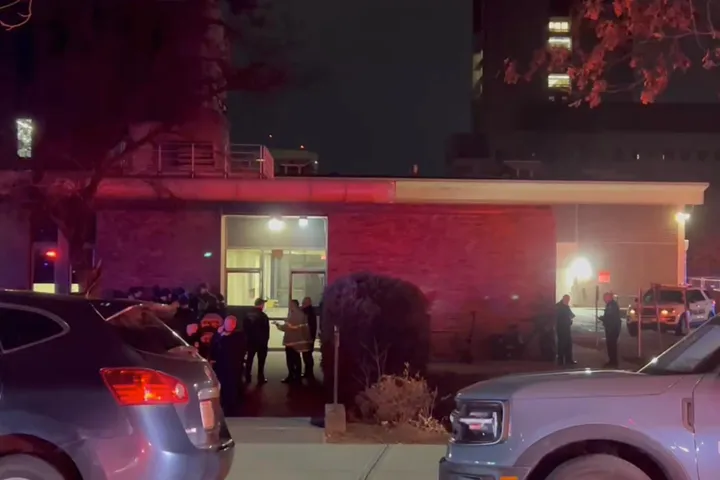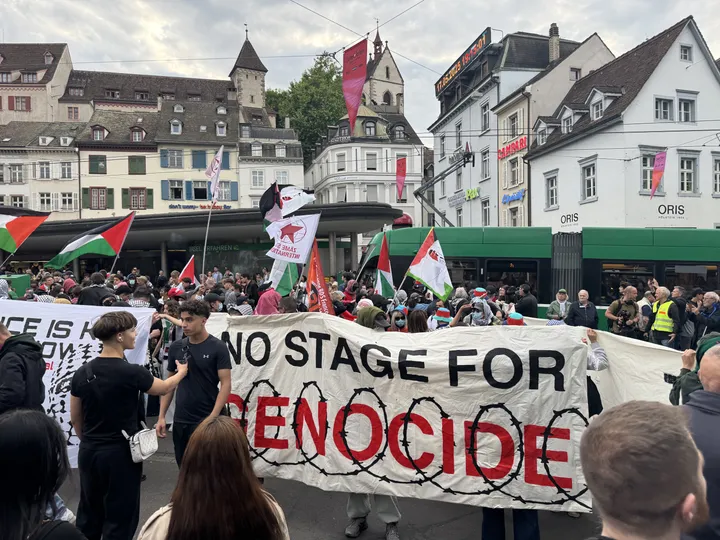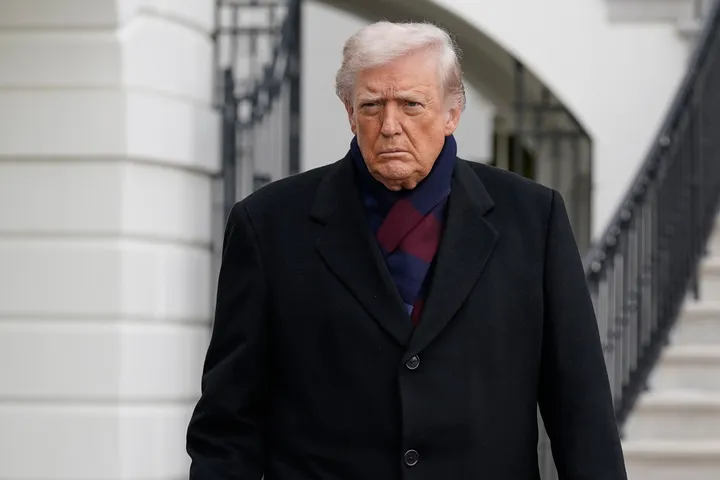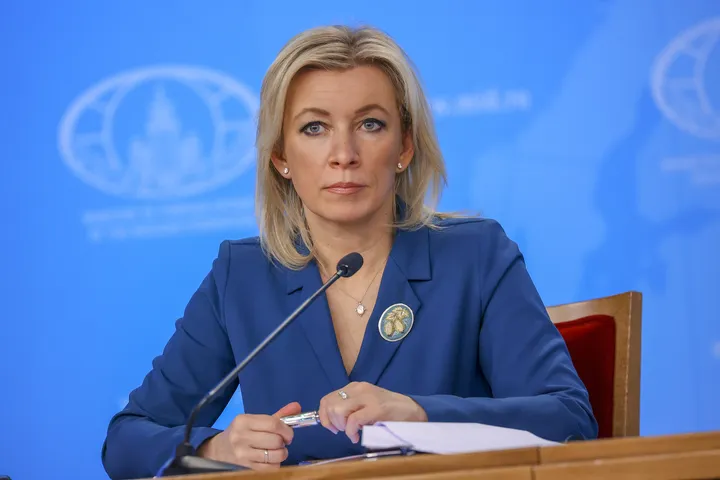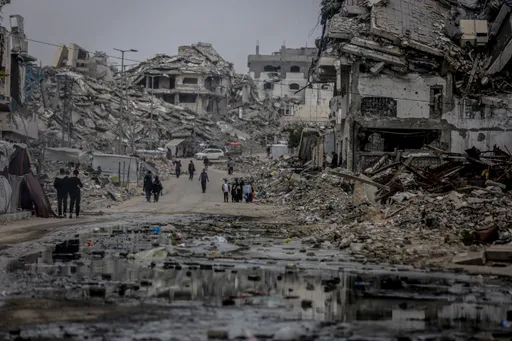Separatist leaders in India-administered Kashmir urged people to defy a ban and join a mass march after Friday prayers this week, the first such call since the federal government revoked the Muslim-majority region's autonomy, stirring anger in the region and beyond.
Hundreds of political leaders and activists, many of them separatists seeking Kashmir's secession from India, have been incarcerated and the appeal to the public came through posters that appeared overnight in the region's main city of Srinagar.
“Every person, young and old, men and women, should march after Friday prayers,” the Joint Resistance Leadership, which represents all major separatist groups, said on one poster.
The public must march to the office of the UN Military Observer group in Srinagar, which was set up in 1949 after the first war between India and Pakistan over Kashmir.
Prime Minister Narendra Modi's government on August 5 scrapped a key law –– Article 370 –– and revoked disputed Kashmir's statehood under which people from the rest of India could not buy property or compete for government jobs and college places.
Both India and Kashmir rule parts of Kashmir and claim it in full. Kashmiris have been fighting for decades for independence from India.
Modi's ruling party had long sought an end to Kashmir's autonomous nature, seeing it as appeasement of minorities and a barrier to its integration with the rest of the country.
But critics said the withdrawal of its legal autonomy would cause further alienation and fuel the 30-year revolt in Indian-administered Kashmir, in which at least 50,000 people have been killed.
The region was under a complete communication blackout for 12 days. Security and communication clampdowns were lifted piecemeal over the weekend but restrictions on movement were reinstated in Srinagar, Kashmir's main city, soon after.
On Wednesday, police reported a gunbattle between security forces and militants in Baramulla in northern Kashmir. A policeman and a rebel were killed, police said. This was the first such clash reported since the new measures were announced.
Crowds have demonstrated frequently in Srinagar despite a ban on public gatherings and the severe restriction of phone and internet services.
One of the posters said the federal government planned to change the demographics of Kashmir by flooding it with outsiders and urged clerics to speak about these fears during their sermons on Friday.
In the Soura part of Srinagar, where protests have flared, some residents said that they would try to join the protests.
“We will try, people will try to go,” said one middle-aged man said, who declined to be identified, after reading a poster pasted at a crossroads near the area’s main mosque.
“But we don’t know if they will let us,” he said.
In the Zainakadal area of Srinagar's old quarter, where all shops were shuttered, and few people roamed, residents said they hadn’t heard of the call for protests.
"If our leaders call, we will come out," said a man said, who also declined to be identified.
“There will be protests, our protests won’t stop.”
On Tuesday, one person was critically wounded when security forces fired pellets in Srinagar's Fatehkadal area during some stone-throwing by protesters, a senior police official and government official said.
“He is on a ventilator,” the government official said of the wounded man.
At least 70 civilians and 20 police and soldiers have been treated at three hospitals in Srinagar for injuries stemming from the clashes, the three officers said.
India-Pakistan's LoC clashes
The Press Trust of India news agency quoted officials as saying one Indian soldier died and four were wounded when Pakistani troops opened fire on forward posts and villages along the Line of Control (LoC) in the Poonch district on Tuesday.
Both India and Pakistan are nuclear powers and the situation in Kashmir, divided between them since 1947, is further complicated by the fact that China also claims part of the Himalayan region.
Trump –– who has previously spoken of his willingness to mediate –– said he would raise the situation over the weekend with Indian Prime Minister Narendra Modi.
Both men are expected in France for a summit of the Group of Seven industrialised nations.
"Kashmir is a very complicated place. You have Hindus and you have the Muslims and I wouldn't say they get along so great," Trump told reporters at the White House.
"I will do the best I can to mediate," he added.
International attention on Kashmir
Highlighting the growing international concern, a senior US official, who has just returned from a visit to the region, called on India on Tuesday to quickly release detainees and restore basic liberties.
"We continue to be very concerned by reports of detentions, and continued restrictions on the residents of the region," the State Department official told reporters.
"We urge respect for individual rights, compliance with legal procedures and an inclusive dialogue," said the official, who spoke on condition of anonymity.
Officials in France said that President Emmanuel Macron would bring up Kashmir with Modi when the two meet in Paris ahead of the G7 summit.
Johnson speaks to Modi
Earlier this year India and Pakistan again came close to all-out conflict over the region after a militant attack in Indian-held Kashmir in February was claimed by a group based in Pakistan, sparking tit-for-tat air strikes.
India has bristled at any suggestion of foreign mediation and strenuously denied a claim by Trump last month that Modi had invited him to act a peace broker.
It was also left seething when the UN Security Council held its first formal meeting on Kashmir in nearly half a century last week, saying it would not accept "international busybodies... tell(ing) us how to run our lives."
British Prime Minister Boris Johnson told Modi in a phone call on Tuesday that the Kashmir dispute must be resolved between India and Pakistan alone, Downing Street said.
An Indian statement said Modi had raised with Johnson the "violence and vandalism perpetrated by a large mob against the High Commission of India in London" on August 15.
Several thousand people had protested in London that day over India's Kashmir move. Police separated them from a smaller pro-Indian counter-demonstration and made at least one arrest.
One of the world's most militarised regions
Thousands of additional Indian troops were sent to man checkpoints in the Kashmir Valley, already one of the world's most militarised regions ahead of August 5.
Telephone communications, cellphone coverage, broadband internet and cable TV services were cut for the valley's 7 million people, although some communications have been gradually restored in places.
Kashmiris have protested and clashed with police since the crackdown, with about 300 demonstrations against India's tighter control over Kashmir, the three officials said.
One of the officials said most of the arrests have been in Srinagar, Kashmir's main city and the heart of a 30-year-old movement to oust Hindu-majority India from Muslim-majority Kashmir so that it can exist independently or be merged with Pakistan.
The official spokesman in Jammu and Kashmir, Rohit Kansal, has repeatedly refused to give any details about arrests and detentions, saying only that they have been made to prevent anti-India protests and clashes in the region. He declined questions about specific arrests.
At least 2,300 detained
At least 2,300 people, mostly young men, were detained in Indian-administered Kashmir after the crackdown, according to top Kashmir police and arrest statistics reviewed by The Associated Press.
Those arrested include anti-India protesters as well as pro-India Kashmiri leaders who have been held in jails and other makeshift facilities, according to three police officials.
The officials have access to all police records but spoke on the condition of anonymity because they weren't authorised to talk to reporters and feared reprisals from superiors.
Nearly 100 people have been arrested under the Public Safety Act, the arrest statistics showed. The law permits detaining people for up to two years without trial.
Moses Dhinakaran, a spokesman for the Central Reserve Police Force, which now holds jurisdiction in Kashmir, said he didn't know how many people had been detained because his agency has "no direct role."
Families crowded outside police stations on Tuesday waiting to appeal for the release of their sons, husbands and other relatives.
At least three dozen men and women along with their children sat on the street outside a Srinagar police station waiting to hear about 22 young men and teenage boys who they said had been detained in a nighttime raid in one neighbourhood.
Residents say police and soldiers carry out the raids to suppress dissent.
Ali Mohammed Rah said police and soldiers burst into his home and dragged his two sons, age 14 and 16, from their beds.
"They forced their entry, trained their guns at us while ordering us not to raise any alarm," Rah said.
He said his wife, who is a heart patient, "pleaded with them to let our boys go but they whisked them away. My wife collapsed and is now in a hospital."
A young woman named Ulfat, who is still recovering from giving birth, said her husband was arrested at their home about 2 am
"Who will provide our family with food and medicine? Where should I go with my baby?" she said, her newborn daughter in her lap.
Raj Begum said her 24-year-old son was taken away barefoot and in shorts.
"Soldiers hit me with a wooden plank as I tried to resist my son's arrest," she said. Her husband, Abdul Aziz, displayed a bag of shoes and clothes for their son.
"Can they at least take these clothes?" he said.
In the Soura area of Srinagar, which has seen some of the biggest protests and clashes, residents have barricaded the neighbourhood by digging trenches, laying barbed wire and erecting poles and corrugated tin sheets to stop the raids.
The residents, carrying axes and sticks, take turns on night patrol and have also distributed stones at street corners to defend against the raids.
Ali Mohammed, 52, said troops had made two unsuccessful attempts to raid the neighbourhood.
"They'll definitely try to come again, but we're ready," he said.
Kashmir has seen mass arrests and lockdowns before. The partition of the territory left India in control of most of Kashmir, and Pakistan and China in charge of other parts of the territory. India has often tried to suppress uprisings, including a bloody armed rebellion in 1989.
About 70,000 people have been killed since that uprising and a subsequent Indian military crackdown.

